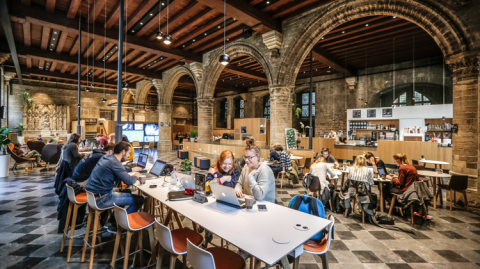Sponsored content: created in partnership with KU Leuven.
Studying abroad can open up a wealth of opportunities and new experiences, but making the jump can be daunting. And for prospective students planning their futures, employability after graduating is increasingly a priority – especially at a time when global economies can feel unstable.
Van Ho, a student from Vietnam, is one of almost 13,500 international students enrolled at KU Leuven University in Belgium. Having already completed her first master’s degree in Belgium six years ago, Ho chose to return to the country to undertake a master’s in communication science with a focus on digital media and society.
Ho has experience working in this industry in Vietnam, but she wanted to hone her skills further. “After the pandemic, I wanted a change in environment and to challenge myself a bit,” she explains. “KU Leuven has a good reputation and Belgium was an easy choice for me because it’s a great country to live in.”
With excellent transport connections, Leuven provides an ideal base for exploring wider Europe. “It means I can easily spend weekends visiting friends in Germany or the Netherlands,” Ho says. Another major draw to studying at KU Leuven was the relatively low cost of living. “Belgium is affordable for me compared to other countries in Europe, and the tuition fees are much lower than elsewhere,” she says.
Ultimately, Ho wants to find a job in Europe after graduating. Belgium offers all students the opportunity to stay in the country for one year after graduation. “Leuven as a city is also really well connected to Brussels – less than an hour away – which has plenty of opportunities to work for big international organisations,” says Ho.
The university takes a skills-based approach to teaching and learning, with a focus on internships, careers fairs and alumni networks. Ho explains that her course focuses on research skills, “something which will be really helpful for me in boosting my experience level and finding a job after studying”.
At KU Leuven’s careers office, advisers are on hand to provide information about graduate schemes and internships, and the university hosts a series of workshops, training sessions and a CV screening service to guide students through job applications and advise on the skills required by employers.
“Jobs fairs organised by the university also provide a valuable chance to meet people from the company in person,” says Ho.
As a student, Ho can work part-time alongside her studies for up to 20 hours a week, which provides her with an opportunity to earn money, gain experience and adapt quickly to the new environment.
“KU Leuven has a very international environment. It’s good for meeting students from different countries and cultures,” says Ho. “I also have the opportunity to exchange knowledge and language skills with classmates who come from other European countries, as well as Asia. I feel very well supported at KU Leuven, and never alone – it feels like home,” she concludes.
about KU Leuven.

Comments